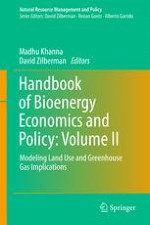2017 | OriginalPaper | Buchkapitel
Lessons from the ILUC Phenomenon
verfasst von : Michael O’Hare, Richard J. Plevin
Erschienen in: Handbook of Bioenergy Economics and Policy: Volume II
Verlag: Springer New York
Aktivieren Sie unsere intelligente Suche, um passende Fachinhalte oder Patente zu finden.
Wählen Sie Textabschnitte aus um mit Künstlicher Intelligenz passenden Patente zu finden. powered by
Markieren Sie Textabschnitte, um KI-gestützt weitere passende Inhalte zu finden. powered by
